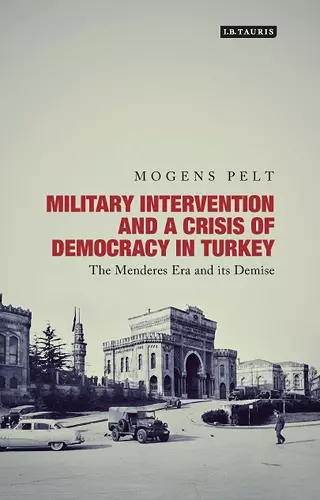Military Intervention and a Crisis of Democracy in Turkey
The Menderes Era and its Demise
Format:Hardback
Publisher:Bloomsbury Publishing PLC
Published:13th Jun '14
Currently unavailable, and unfortunately no date known when it will be back

Adnan Menderes' election to power in 1950 signalled a new epoch in the history of modern Turkey. For the first time a democratic government ruled the country, challenging the political monopoly of the Kemalist elites. This title explores the Menderes period, shedding light on the shaping of post-war Turkey.
Adnan Menderes' election to power in 1950 signalled a new epoch in the history of modern Turkey. For the first time a democratic government ruled the country, taking over Kemal Ataturk's political heirs, the People's Republican Party (CHP), and challenging the Kemalist elite's monopoly on the control of state institutions and society itself. However, this period was short-lived. In 1960, Turkey's army staged a coup d'etat and Menderes was hanged the following year. Here, Mogens Pelt beings by examining the era of the rule of the Democratic Party, and what led to its downfall. Among the chief accusations raised against Menderes by the army was that he had undermined the principles of the founder of modern Turkey, Ataturk, and that he had exploited religion for political purposes. Military Intervention and a Crisis Democracy in Turkey furthermore, and crucially, examines the legacy of the military intervention that brought this era of democratic rule to an end.
Although the armed forces officially returned power to the civilians in 1961, this intervention - indeed, this crisis of democracy - allowed the military to become a major player in Turkey's political process, weakening the role of elected politicians. The officer corps claimed that the army was the legal guardian of Kemalism, and that it had the right and duty to intervene again, if the circumstances proscribed it and when it deemed that the values of Ataturk were threatened. Indeed, these were precisely that ground on which the armed forces justified its coup d'etats of 1971 and 1980. This unique exploration of the Menderes period sheds new light on the shaping of post-war Turkey and will be vital for those researching the Turkish Republic, and the influence of the military in its destiny.
Mogens Pelt has produced an excellent, thorough and at times fascinating revisionit study of the Menderes period of post-World War II Turkey...Pelt's meticulous analysis of a broad range of sources, coupled with his keen eye for the intrigues hitherto ignored in the scholarship, makes this an excellent read...Pelt opens up an entirely new sub-genre of research and thus burns a trail for future scholars. As such, this is a most welcome new addition to the scholarship on postwar Turkey and its volatile struggle to move from authoritarian to democratic rule. It should become a classic reference for generations to come. Isa Blumi, Associate Professor of Middle East and Global History, Georgia State University and Visiting Associate Professor, International History, Graduate Institute, Geneva Mogens Pelt's [book]... fills a major gap in the scholarly literature on Turkey, and does an excellent job of bringing out the tensions between unelected Ataturkist secular elites and an elected government legitimized by the 1950 electoral victory of moderate Islamist populism...[It] sheds precious light on the fundamental structural tensions of the modern Turkish state, and offers a major new contribution to our understanding of Turkish foreign policy and the role of the Turkish military in domestic politics since World War II. Brady Kiesling, former US diplomat and author of Diplomacy Lessons: Realis for an Unloved Superpower (2006).
ISBN: 9781848857780
Dimensions: unknown
Weight: 508g
312 pages